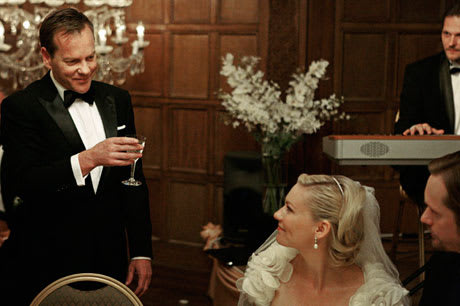The thing I like most about Lars von Trier's films is his unique ability to challenge dominant morality, essentially telling large groups of people to go screw themselves and their assimilative piety with such clarity and seeming ease. He manages to get to the core of social hypocrisies amidst the etiquettes and niceties, often aggressively communicating his point in a shocking and horrific manner, giving a visceral appeal for those less interested in dissecting his message.
Even though Melancholia ostensibly deals with the end of the world, spending its latter half detailing the varying reactions of sisters Claire (Charlotte Gainsbourg) and Justine (Kirsten Dunst) to the impending collision of Earth with another planet, it's surprisingly low key, making its point with the same clever, almost snarky structure as Antichrist, only without the violence and mutilation.
In fact, the first half is almost comedic, focusing on Justine's wedding and channelling Fat Girl in its juxtaposition of a comic and horrific take on the same subject to inspire introspection. Feeling depressed after her mother (Charlotte Rampling) makes a speech predicting a short marriage, she's repeatedly told to cheer up by her anxious sister, whose husband, John (Kiefer Sutherland), takes every opportunity to remind everyone how much the wedding cost.
While identification with the melancholic Justine is implied, the intrinsic notion of nuptials as a sunny celebration assign judgment to the well-adjusted who will similarly want her to "just be happy."
This light-hearted first half, with its sassy insults and pseudo-sarcastic depiction of an affluent party, is contrasted with the possibility that the world might come to an end. It's here that depression is explored and assessed with astounding insight, as Claire and John cope with the varying stages of paranoia, denial and melancholy associated with annihilation anxiety that Justine was suffering on her wedding day.
Unsurprisingly, von Trier's occasional slow motion, artistic photography makes melodic the almost dryly-analytic nature of this exceedingly realistic depiction of impending sadness and doom. He mixes realism with fantastical imagery to fuse the literal with artistic expression, adding intrigue to what is essentially a pedagogical exercise in telling off everyone that dismisses the validity of depression.
While certainly not as shocking or overtly memorable as some of his previous works, Melancholia is exceedingly clear in its point and resultantly cathartic to anyone that can relate to his assertion.
(eOne)Even though Melancholia ostensibly deals with the end of the world, spending its latter half detailing the varying reactions of sisters Claire (Charlotte Gainsbourg) and Justine (Kirsten Dunst) to the impending collision of Earth with another planet, it's surprisingly low key, making its point with the same clever, almost snarky structure as Antichrist, only without the violence and mutilation.
In fact, the first half is almost comedic, focusing on Justine's wedding and channelling Fat Girl in its juxtaposition of a comic and horrific take on the same subject to inspire introspection. Feeling depressed after her mother (Charlotte Rampling) makes a speech predicting a short marriage, she's repeatedly told to cheer up by her anxious sister, whose husband, John (Kiefer Sutherland), takes every opportunity to remind everyone how much the wedding cost.
While identification with the melancholic Justine is implied, the intrinsic notion of nuptials as a sunny celebration assign judgment to the well-adjusted who will similarly want her to "just be happy."
This light-hearted first half, with its sassy insults and pseudo-sarcastic depiction of an affluent party, is contrasted with the possibility that the world might come to an end. It's here that depression is explored and assessed with astounding insight, as Claire and John cope with the varying stages of paranoia, denial and melancholy associated with annihilation anxiety that Justine was suffering on her wedding day.
Unsurprisingly, von Trier's occasional slow motion, artistic photography makes melodic the almost dryly-analytic nature of this exceedingly realistic depiction of impending sadness and doom. He mixes realism with fantastical imagery to fuse the literal with artistic expression, adding intrigue to what is essentially a pedagogical exercise in telling off everyone that dismisses the validity of depression.
While certainly not as shocking or overtly memorable as some of his previous works, Melancholia is exceedingly clear in its point and resultantly cathartic to anyone that can relate to his assertion.
